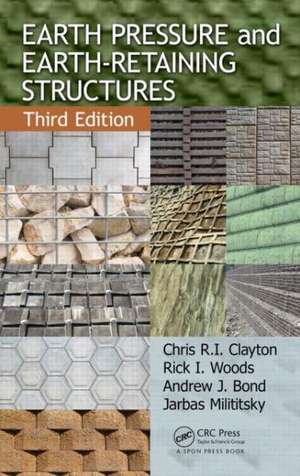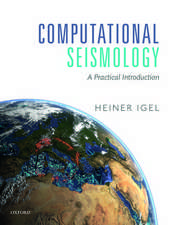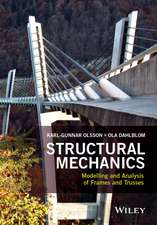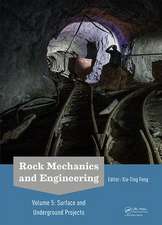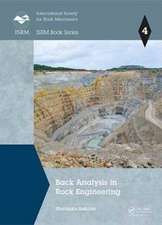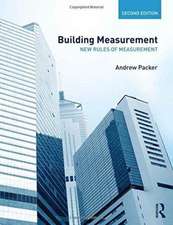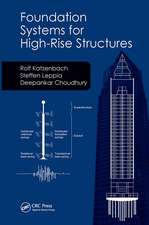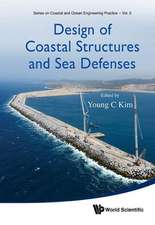Earth Pressure and Earth-Retaining Structures
Autor Chris R.I. Clayton, Rick I. Woods, Jarbas Milititskyen Limba Engleză Paperback – 28 mai 2014
When it comes to designing and constructing retaining structures that are safe and durable, understanding the interaction between soil and structure is at the foundation of it all. Laying down the groundwork for the non-specialists looking to gain an understanding of the background and issues surrounding geotechnical engineering, Earth Pressure and Earth-Retaining Structures, Third Edition introduces the mechanisms of earth pressure, and explains the design requirements for retaining structures. This text makes clear the uncertainty of parameter and partial factor issues that underpin recent codes. It then goes on to explain the principles of the geotechnical design of gravity walls, embedded walls, and composite structures.
What’s New in the Third Edition:
The first half of the book brings together and describes possible interactions between the ground and a retaining wall. It also includes materials that factor in available software packages dealing with seepage and slope instability, therefore providing a greater understanding of design issues and allowing readers to readily check computer output. The second part of the book begins by describing the background of Eurocode 7, and ends with detailed information about gravity walls, embedded walls, and composite walls. It also includes recent material on propped and braced excavations as well as work on soil nailing, anchored walls, and cofferdams. Previous chapters on the development of earth pressure theory and on graphical techniques have been moved to an appendix.
Earth Pressure and Earth-Retaining Structures, Third Edition is written for practicing geotechnical, civil, and structural engineers and forms a reference for engineering geologists, geotechnical researchers, and undergraduate civil engineering students.
| Toate formatele și edițiile | Preț | Express |
|---|---|---|
| Paperback (1) | 422.57 lei 3-5 săpt. | +36.66 lei 6-10 zile |
| CRC Press – 28 mai 2014 | 422.57 lei 3-5 săpt. | +36.66 lei 6-10 zile |
| Hardback (1) | 1326.99 lei 6-8 săpt. | |
| CRC Press – 27 iul 2017 | 1326.99 lei 6-8 săpt. |
Preț: 422.57 lei
Preț vechi: 459.32 lei
-8% Nou
Puncte Express: 634
Preț estimativ în valută:
80.87€ • 87.81$ • 67.93£
80.87€ • 87.81$ • 67.93£
Carte disponibilă
Livrare economică 02-16 aprilie
Livrare express 18-22 martie pentru 46.65 lei
Preluare comenzi: 021 569.72.76
Specificații
ISBN-13: 9781466552111
ISBN-10: 1466552115
Pagini: 608
Ilustrații: 330 black & white illustrations, 43 black & white tables
Dimensiuni: 156 x 234 x 33 mm
Greutate: 0.9 kg
Ediția:3 Rev ed.
Editura: CRC Press
Colecția CRC Press
ISBN-10: 1466552115
Pagini: 608
Ilustrații: 330 black & white illustrations, 43 black & white tables
Dimensiuni: 156 x 234 x 33 mm
Greutate: 0.9 kg
Ediția:3 Rev ed.
Editura: CRC Press
Colecția CRC Press
Public țintă
Professional Practice & DevelopmentCuprins
Part I. Fundamentals. Soil behaviour. Soil properties. Factors affecting earth pressure. Water and retaining structures. Global and local instability. Part II. Design. Wall selection. Avoiding failure. Introduction to analysis. Gravity walls. Embedded walls. Composite walls and other support systems. Appendix A: Classical earth pressure theory. Appendix B: Earth pressure coefficients. References. Index.
Recenzii
"It offers a comprehensive introduction to the mechanisms of earth pressure and provides a thorough guide to the design requirements for retaining structures." - Librairie Lavoisier
Notă biografică
Chris R.I. Clayton, Rick I. Woods, Rick I. Woods, Jarbas Milititsky
Descriere
This classic work book has long been recognized as a comprehensive introduction to the mechanisms of earth pressure, and a thorough guide to the design requirements for retaining structures. It has now been entirely restructured and revised, providing significantly more support to help non-specialists understand the geotechnical issues and giving background to uncertainty of parameters and partial factor issues that underpin recent codes such as Eurocode 7. It comprehensively covers the principles of the geotechnical design of gravity walls, embedded walls, and composite structures.
